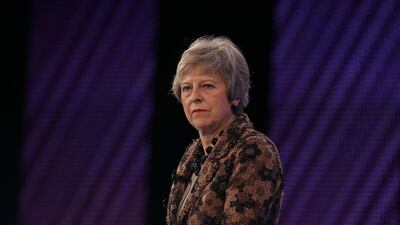British Prime Minister Theresa May got a reprieve in one of her Brexit battles on Tuesday as party rebels said they did not yet have the strength for a leadership challenge. But she faced a new headache as parliamentary allies warned they could remove support for her minority government if Mrs May does not alter her divorce deal with the European Union.
Northern Ireland's Democratic Unionist Party struck a deal last year for its 10 politicians to back the Prime Minister's Conservatives on major legislation. But the Protestant, pro-UK party opposes the Brexit deal's plans for keeping the border between Northern Ireland and EU member Ireland open after Brexit, saying it weakens the ties binding the UK by creating separate trade rules for Northern Ireland.
In a warning to Mrs May, DUP politicians abstained or opposed the government during several votes on a finance bill late on Monday.
DUP MP for East Antrim Sammy Wilson said the votes were "designed to send a political message to the government: Look, we've got an agreement with you but you've got to keep your side of the bargain."
The Prime Minister defended her Brexit deal in an article for Tuesday's Belfast Telegraph, saying it "puts Northern Ireland in a fantastic position for the future".
She said businesses would benefit because Northern Ireland would "be a gateway to both the EU market and the rest of the UK's market".
In a sign of how important the DUP has become, two key figures from both sides of the Brexit debate will attend the party's annual conference this weekend. According to Reuters, the Chancellor of the Exchequer Philip Hammond and former Foreign Secretary Boris Johnson are both expected in Belfast this weekend.
There was better news for the beleaguered British leader when a leading pro-Brexit politician acknowledged that the rebels haven't mustered the numbers for a leadership challenge.
Jacob Rees-Mogg is one of a group of Conservative MPs who have written letters calling for a no-confidence vote in the prime minister. They say the draft divorce deal would leave Britain tied to the bloc's rules without any say in making them.
The group had previously said it was confident of getting the 48 letters — 15 per cent of Conservative parliamentarians — needed to spark a leadership challenge.
"Patience is a virtue, virtue is a grace," Mr Rees-Mogg said on Tuesday. "We shall see whether letters come in due time."
The draft agreement reached last week triggered an avalanche of criticism in Britain and left Mrs May fighting to keep her job even as British and EU negotiators raced to firm up a final deal before a summit on Sunday where EU leaders hope to rubber-stamp it.
The 585-page, legally binding withdrawal agreement is as good as complete, but Britain and the EU still need to flesh out a far less-detailed declaration on their future relations.
Mrs May's office said she would meet European Commission President Jean-Claude Juncker in Brussels on Wednesday as part of work to finalise the declaration.
EU leaders have largely welcomed the deal, but Spain expressed concerns, saying the wording leaves unclear how Gibraltar, the British territory at the southern tip of the Iberian Peninsula, would be dealt with.
Spanish Prime Minister Pedro Sanchez said on Tuesday that his country would vote against the divorce agreement if Gibraltar's future isn't considered a bilateral issue between Madrid and London.
Mr Sanchez told a business forum in Madrid that Spain "cannot accept that what will happen to Gibraltar in the future depends on negotiations between the UK and the EU. It will have to be something that we define and we negotiate and agree between the UK and Spain".

